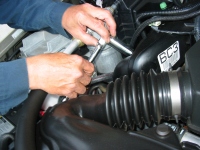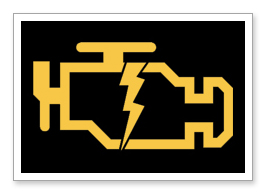Posted on 1/18/2013
Since Jan. 1, we've only had two days where the temperature reached above freezing and it's regularly been in the single digits and teens. Cold weather reduces a battery's effectiveness and a dead battery could endanger your life if you're stranded in freezing weather. This article at Fifthgear sums it up well. Cold weather reduces a battery's ability to hold a charge and to accept recharging (really hot weather is just as bad but we'll get into that later). Modern cars especially have lots of electronics that suck battery power as well. Stop by Plantation Tune Tech any time and we will check your battery's condition for free. You can trust us not to try and sell you a product you don't need. If your battery is fine, we'll send you on your way. If your battery is old, damaged or at risk of failing, we can also help with a replacement and we can installed ... read more
Posted on 1/2/2013
Cold weather is brutal on cars. Oils thicken and take longer to reach engine components and lubricate, metal and rubber hoses become more brittle and more subject to breakage and stress. Batteries lose power. In the old days, it was common advice to warm up your car before driving off, to give it a chance to get used to the cold. That was necessary for older fuel injection systems but in modern cars, a warm up is no longer a necessity. However, we do recommend people give their cars a three-minute warmup. This gives oils a chance to become thinner and reach all the way into the engine. Hoses become more flexible and less likely to crack. Letting the car sit and warm up gives this a chance to happen, before putting additional load on the engine, brakes, transmission and drive train through movement. Plugging into an engine heater also isn't a bad idea, if your car has one
Posted on 11/11/2012
People sometimes wonder why they should pay a little more for an oil change at an auto shop, when a quick-lube joint could change their oil for less. We do lots of oil changes, hundreds a year. Every now and then, during the course of an oil change, we find a more serious problem, something that could lead to an engine failure. The kind of thing that makes your engine stop on the freeway without warning. We discover these things and give our best assessment of what's at stake and how to fix it. Sometimes, the fix is simple and other times not. But the point is these problems would most likely be overlooked at one of the quick-lube business. When we do an oil change, we have a trained, experienced technician look for a variety of potential problems in the engine, transmission, suspension, exhaust, drive train and more. Staff at a quick-lube place don't have the training, time or interest in the overall car. Their job is to change your oil; ours is to assure reliability, over ... read more
Posted on 8/27/2012
We mostly deal with the insides of cars, but we're also interested in the whole package. This story from thecarconnection.com has good information about the need to wash ash residue from your car. In Idaho, August has seen weeks of smoke-filled air from wildfires and a good deal of that has wound up on cars. According to the story, if water is allowed to mix with the ash on the car, it will create potassium hydroxide, which is similar to drain cleaner and will etch paint. The best solution is to keep your car garaged, but that's not possible if you're out driving. A good car wash or at least rinsing it off the car daily is the next best option
Posted on 4/10/2012
The techs over at Pep Boys have put up some good tips for air conditioner care, including warning signs. If you experience any of these, don't take any chances and bring your car in for a checkup. A/C system doesn't cool vehicle to set temperature Fan/blower does not work when set in A/C mode Fan/blower is louder than usual Some or all of the dash controls do not work Heater, top and side vents, or defroster do not work A/C or engine makes loud noises when the heat or A/C is turned on Vehicle stalls or idles roughly when A/C is turned on Vehicle runs hot or overheats when A/C is on There is water on the car's floor Electric engine cooling fan quickly cycles on and off Unusual odors come from interior vents A/C unit has not been serviced regularly Windows fog when defroster is ... read more
Posted on 4/6/2012
Care and Maintenance Tips Keep Your Car Running in Top-Notch ConditionWe've compiled our best expert advice, surprising tricks, and car care tips to prolong the life of your automobile! 1. Be patient during the break-in period You've bought your dream car and now you want to make it last at long as possible in top condition. Here are some things to remember as you pull it out of the dealer's lot: During the break-in period, typically the first 1,000 miles (1,600 km), keep your speed under 55 mph (88 kpm) or to the speed recommended by your car's manufacturer. Avoid heavy loads on the drive train, such as towing trailers, and loading the roof rack or trunk with heavy construction materials. Do not allow your new car to idle for long periods - this is good advice for the life of your car, but especially during breakin. The oil pressure generated by doing so may not be sending oil to every part of your engine. Use only ligh ... read more
Posted on 3/16/2012

Keep Your Engine Properly Tuned Fixing a car that is noticeably out of tune or has failed an emissions test can improve its gas mileage by an average of 4 percent, though results vary based on the kind of repair and how well it is done. Fixing a serious maintenance problem, such as a faulty oxygen sensor, can improve your mileage by as much as 40 percent. Fuel Economy Benefit: 4% Equivalent Gasoline Savings: $0.15/gallon Keep Tires Properly Inflated You can improve your gas mileage by up to 3.3 percent by keeping your tires inflated to the proper pressure. Under-inflated tires can lower gas mileage by 0.3 percent for every 1 psi drop in pressure of all four tires. Properly inflated tires are safer and last longer. The proper tire pressure for your vehicle is usually found on a sticker in the driver’s side door jamb or the glove box and in your owner’s manual. Do not use the maximum pressure printed on the tire’s sidewall. Fuel Economy Benefi ... read more
Posted on 12/9/2011

Few things are as worrisome as having the CHECK ENGINE light go on while driving. These tips from Consumer Reports can help you determine whether your vehicle has a loose gas cap or serious engine problems. The feared check engine light! Call it the most misunderstood indicator on your dashboard, the "check engine" light can mean many different things, from a loose gas cap to a seriously misfiring engine. Ignore the warning, and you could end up damaging expensive components. It also can be a sign that your car is getting poor fuel economy and emitting higher levels of pollutants. What the Light Means The "check engine" light is part of your car's so-called onboard diagnostics (OBD) system. Since the 1980s, computers increasingly have controlled and monitored vehicle performance, regulating such variables as engine speed (RPM), fuel mi ... read more
Posted on 11/17/2011
Readers Digest has great car tips and here is one that can help you. Does your car key share a chain with a dozen or more other keys? That's a pretty heavy load hanging off the car key when it's in the ignition.The weight, combined with bouncing while you drive, can wear out the tumblers inside the ignition and eventually lead to ignition switch failure.To add years of service to your ignition switch, purchase a lightweight key chain that allows you to separate your ignition key from the others. Drive with only the ignition key in your ignition. If your ignition key "sticks" when you try to turn on the car, it's a warning that your ignition switch is about to fail. Replace it before you get stranded
Posted on 10/31/2011
Some more good tips from the National Institute for Automotive Service Excellence:Engine Performance-Get engine driveability problems (hard starts, rough idling, stalling, diminished power, etc.) corrected at a good repair shop. Cold weather makes existing problems worse. Replace dirty filters-air, fuel, PCV, etc. A poorly running engine is less efficient and burns more gasoline. Fuel-Put a bottle of fuel de-icer in your tank once a month to help keep moisture from freezing …in the fuel line. Note, too, that a gas tank that's kept filled helps prevent moisture from forming. Oil-Change your oil and oil filter as specified in your manual-more often if your driving is mostly stop-and-go or consists of frequent short trips. A poll of ASE Master Auto Technicians revealed that re ... read more